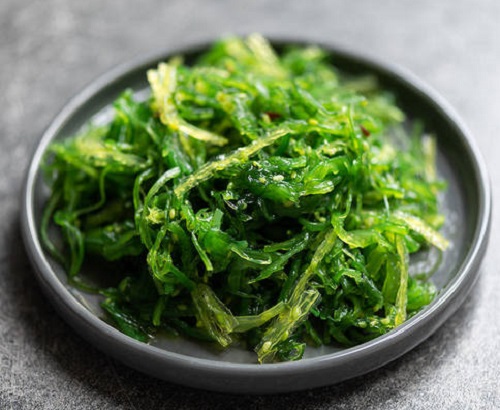Can Dogs Eat Seaweed? Is it a safe treat or a slippery slope for your four-legged friend? Let’s find out.
Can Dogs Eat Seaweed? Read here all the necessary considerations for your furry friend with us here!
What is Seaweed?

Seaweed, also known as macroalgae, is a type of marine plant that grows in saltwater environments such as oceans, seas, and coastal areas. It encompasses a diverse group of algae species, ranging from small microscopic forms to large kelp forests. Seaweed plays a crucial role in marine ecosystems by providing habitats and oxygen and serving as a food source for various marine organisms.
In addition to its ecological significance, seaweed is commonly used in Asian cuisines, particularly in sushi, salads, and soups. Seaweed is known for its high nutrient content, including vitamins, minerals, and antioxidants.
Check out Can Dogs Eat Tilapia here
Can Dogs Eat Seaweed?
Yes, dogs can eat seaweed, but you have to keep certain considerations in mind.
Seaweed, specifically certain types like nori, can be given to dogs in moderation and with caution. Seaweed is a rich source of vitamins and minerals, including iodine, calcium, and iron, which can benefit a dog’s overall health. However, do remember that excessive consumption of seaweed can lead to gastrointestinal issues in dogs.
You must be careful with seaweed varieties, such as kelp. It contains high levels of sodium, which can be harmful to dogs with certain medical conditions. To be on the safe side, consult with a veterinarian to ensure it is appropriate for your pet and to determine the right quantity based on their specific needs. Also, avoid flavored or seasoned seaweed products, as they often contain additives, such as garlic or onion, which can be toxic to dogs.
Is Seaweed Good for Dogs—Health Benefits

Seaweed can offer some health benefits to dogs when consumed in moderation. Here are a few potential benefits:
- Rich in Nutrients: Seaweed is packed with essential vitamins, minerals, such as iodine, iron, calcium, potassium, and antioxidants. These nutrients can contribute to your dog’s overall health and well-being.
- Supports Thyroid Function: Seaweed is a natural source of iodine, which is essential for maintaining proper thyroid function in dogs. Adequate iodine levels help regulate metabolism and promote healthy growth.
- Digestive Health: The fiber content in seaweed can aid in digestion and promote regular bowel movements. It may help alleviate constipation and improve overall digestive health in dogs.
- Immune System Support: Antioxidants found in seaweed, such as vitamins A, C, and E, along with various phytonutrients, can support your dog’s immune system and help protect against oxidative stress.
- Dental Health: Kelp is packed with natural enzymes that can help reduce plaque and tartar buildup on your dog’s teeth, promoting better oral health.
Read about Can Dogs Eat Spam here
Is Seaweed Bad for Dogs-Health Concerns
While seaweed can have health benefits for dogs when consumed in moderation, there are also some potential health concerns to be aware of:
- High Iodine Content: While iodine is necessary for thyroid function, excessive amounts can be harmful to dogs. Some types of seaweed, particularly kelp, can contain high levels of iodine, which may lead to thyroid problems if consumed in large quantities over an extended period.
- Sodium Content: Seaweed naturally contains some sodium, and excessive sodium intake can be problematic for dogs, particularly those with certain health conditions like heart disease or high blood pressure. It’s essential to choose low-sodium seaweed options and limit the amount given to your dog.
- Digestive Issues: While seaweed can be a source of dietary fiber, excessive consumption can lead to digestive upset, such as diarrhea or gas. It’s important to introduce seaweed gradually and monitor your dog’s response.
- Contaminants: Seaweed harvested from polluted waters can contain contaminants like heavy metals or toxins, which can be harmful to dogs.
- Allergies or Sensitivities: Some dogs may have allergies or sensitivities to seaweed or specific types of seaweed. If you notice any signs of an allergic reaction, such as itching, rashes, or gastrointestinal distress, discontinue the use of seaweed and consult with your veterinarian.
Dog-Safe Seaweed Recipe

Ingredients:
- 1 cup dried edible seaweed (such as nori or dulse)
- 1 tablespoon coconut oil or olive oil (optional)
Instructions:
- Preheat your oven to 300°F (150°C) and line a baking sheet with parchment paper.
- Cut the dried seaweed into smaller, bite-sized pieces using kitchen scissors or tear them by hand.
- Place the seaweed pieces on the baking sheet in a single layer. If desired, lightly brush them with coconut oil or olive oil for added flavor and to help with crispiness.
- Bake the seaweed in the preheated oven for about 10-15 minutes or until it becomes crispy and slightly curled. Keep a close eye on them to prevent burning.
- Remove the seaweed from the oven and let it cool completely.
- Once cooled, store the seaweed crunchies in an airtight container.
Note: Remember to feed these seaweed crunchies to your dog as a treat or a supplement to their regular diet.
Can Dogs Eat Corn Tortillas Read here!
Types of Seaweed Dogs Can/Can’t Eat
1. Can eat:
- Nori: Plain nori seaweed without any added flavors or seasonings is safe for dogs in moderation.
- Dulse: Dulse seaweed is safe for dogs and can be given in small amounts.
- Kelp: Kelp is generally safe for dogs, and people often use it in supplements or as a natural source of iodine.
- Wakame: Wakame seaweed is safe for dogs when given in moderation and without any added ingredients or seasonings.
- Hijiki: One should avoid Hijiki seaweed due to its high arsenic content.
2. Can Eat with Caution:
- Irish Moss: Properly preparing Irish Moss, ensuring it is free from additives, and giving it to dogs in moderation can make it safe for them.
Spirulina: Spirulina, a type of blue-green algae, is sometimes included in pet supplements.
3. Should Avoid:
- Seaweed with Additives or Seasonings: Adding flavors, spices, or salt to seaweed products should be avoided as they can be harmful to dogs.
- Seaweed Salads or Dishes: Seaweed salads or dishes intended for human consumption may contain ingredients or dressings that are not safe for dogs.
- Unknown or Wild Seaweed: It’s best to avoid giving dogs any unknown or wild seaweed, as it may contain contaminants or toxins.
Can Dogs Eat Seaweed—Some Precautions
- Choose the Right Type: Opt for edible seaweed varieties specifically meant for consumption by both humans and pets. Avoid seaweed products that contain additives, seasonings, or other potentially harmful ingredients.
- Moderation is Key: Introduce seaweed to your dog’s diet gradually and in small amounts. This allows their digestive system to adjust and minimizes the risk of any adverse reactions.
- Monitor for Any Adverse Reactions: Keep a close eye on your dog after introducing seaweed to their diet. Watch for any signs of digestive upset, allergic reactions, or changes in behavior. If any negative symptoms occur, discontinue feeding seaweed and consult your veterinarian.
- Ensure Clean Sourcing: Use seaweed that is sourced from clean waters and reputable suppliers. This helps minimize the risk of contamination with pollutants or toxins.
- Consult with Your Veterinarian: Before adding seaweed or any new food to your dog’s diet, it’s always wise to consult with your veterinarian. They can provide guidance based on your dog’s specific health needs and dietary requirements.
Check out Can Dogs Eat Herbs here
FAQs
1. Can Dogs Eat Dried Seaweed?
Yes, dogs can eat dried seaweed in moderate amounts. Dried seaweed, such as nori, is generally safe for dogs to eat in small amounts. Seaweed is a good source of various nutrients, including vitamins, minerals, and fiber. Make sure it’s free from additives or seasonings, and introduce it gradually into their diet.
2. Can Dogs Eat Seaweed Snacks?
Dogs can eat seaweed snacks designed specifically for canine consumption. These snacks are typically formulated with dogs’ dietary needs in mind and are free from harmful additives or seasonings. Seaweed snacks made for dogs can be a healthy and low-calorie treat option, as seaweed is rich in nutrients and fiber.
3. Can Dogs Eat Roasted Seaweed?
Roasted seaweed, such as the type used for human consumption as a snack or sushi wrap (commonly known as nori), can be safe for dogs to eat in moderation as it doesn’t contain any added seasonings or harmful ingredients.
4. Can Dogs Eat Nori Seaweed?
Yes, dogs can eat nori seaweed in moderation. Nori is a type of seaweed commonly used in sushi and other Asian dishes. It is generally safe for dogs to consume as long as it is plain and free from any additional seasonings or additives.Nori seaweed, known for its richness in vitamins, minerals, and fiber, can offer dogs some nutritional benefits.
5. Can Dogs Eat Seaweed Salad?
While some ingredients commonly found in seaweed salad, such as seaweed itself, can be safe for dogs to consume in moderation, it’s important to exercise caution when offering them seaweed salad.
Seaweed salad typically contains various ingredients, including seaweed, sesame oil, soy sauce, sugar, vinegar, and sometimes additional seasonings or vegetables.
6. Can Dogs Eat Seaweed Chips?
Yes, dogs can eat seaweed chips in moderation, but it’s important to choose plain chips without harmful additives or excessive salt. Offer them as an occasional treat, monitor for any adverse reactions or allergies, and consult with your veterinarian for personalized advice. Remember to prioritize a balanced diet and portion control for your dog’s overall well-being.
7. Can Dogs Eat Seaweed with Salt?
No, it is not recommended to give dogs seaweed with added salt. Plain seaweed without salt is a healthier option for dogs, and excessive salt intake can be harmful to their health.
8. Can Dogs Eat Sushi Seaweed?
Dogs can enjoy plain sushi seaweed, known as nori, in moderation. It’s important to remove any fillings or other ingredients, ensuring that only the plain seaweed is given to the dog. Start with small amounts and monitor for any negative reactions or allergies. Consulting with a veterinarian is always recommended for personalized guidance.
9. Can Dogs Eat Seaweed Paper?
Dogs can safely eat plain seaweed paper, commonly known as nori, in moderation. It’s important to ensure that the seaweed paper is free from any seasonings, salts, or harmful additives that may be present in flavored varieties. Plain nori sheets without additional ingredients are the best option for dogs.
10. Can Dogs Eat Organic Roasted Seaweed?
Yes, dogs can eat organic roasted seaweed in moderation. Ensure it is plain and organic without additives. Introduce it gradually, monitor for allergies or sensitivities, and consult your veterinarian for personalized advice. Treats should only be a small part of your dog’s diet, and a balanced dog-specific diet is crucial for their well-being.
11. Can Dogs Eat Seaweed Rice Crackers?
Yes, dogs can eat seaweed rice crackers in moderation. Choose plain crackers without harmful additives or excessive salt. Offer them in limited quantities as treats and monitor your dog for any adverse reactions.
12. Can Dogs Eat Wakame Seaweed?
Dogs can eat wakame seaweed in moderation. Wakame is a type of edible seaweed commonly used in Asian cuisine. It is generally safe for dogs to consume as long as it is properly prepared and offered in small amounts.
13. Can Dogs Eat Wasabi Seaweed?
No, dogs should not eat wasabi seaweed or any other food containing wasabi. Wasabi is a spicy condiment that contains ingredients such as horseradish, mustard, and green food coloring. The strong flavor and spiciness of wasabi can cause gastrointestinal distress, irritation, and discomfort for dogs.
